translation of idioms英语习语翻译21
- 格式:ppt
- 大小:2.61 MB
- 文档页数:30
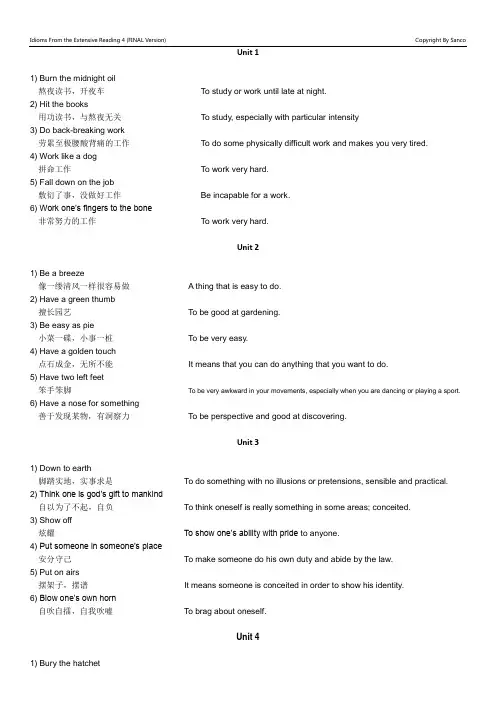
Unit 11) Burn the midnight oil熬夜读书,开夜车To study or work until late at night.2) Hit the books用功读书,与熬夜无关To study, especially with particular intensity3) Do back-breaking work劳累至极腰酸背痛的工作To do some physically difficult work and makes you very tired.4) Work like a dog拼命工作To work very hard.5) Fall down on the job敷衍了事,没做好工作Be incapable for a work.6) Work one’s fingers to the bone非常努力的工作To work very hard.Unit 21) Be a breeze像一缕清风一样很容易做 A thing that is easy to do.2) Have a green thumb擅长园艺To be good at gardening.3) Be easy as pie小菜一碟,小事一桩To be very easy.4) Have a golden touch点石成金,无所不能It means that you can do anything that you want to do.5) Have two left feet笨手笨脚To be very awkward in your movements, especially when you are dancing or playing a sport.6) Have a nose for something善于发现某物,有洞察力To be perspective and good at discovering.Unit 31) Down to earth脚踏实地,实事求是To do something with no illusions or pretensions, sensible and practical. 2) Think one is god’s gift to mankind自以为了不起,自负To think oneself is really something in some areas; conceited.3) Show off炫耀To show one’s ability with pride to anyone.4) Put someone in someone’s place安分守己To make someone do his own duty and abide by the law.5) Put on airs摆架子,摆谱It means someone is conceited in order to show his identity.6) Blow one’s own horn自吹自擂,自我吹嘘To brag about oneself.Unit 4言归于好,和解,摒弃前嫌To stop being unfriendly and become friends again.2) Button one’s lips一言不发,守口如瓶To refuse to talk and be silenced.3) Flow with the tide跟风,紧随潮流To keep following someone or the trend.4) Hold one’s tongue保持沉默,不开口To say nothing about something and stay silent.5) Let sleeping dogs lie别无事生非,招惹麻烦To avoid mentioning a subject or something that happened in the past, in order to avoid any problems or arguments.6) Mind one’s own business少管闲事,管好自己To concern oneself only with what is of interest to oneself and not interfere in the affairs of others.7) Rock the boat捣乱To do something that upsets a situation and causes problems.8) See eye to eye看法完全一致,完全同意To share the same views as somebody about something.Unit 51) Face up to something勇敢的面对To accept and deal with something that is difficult or unpleasant.2) Point one’s finger at someone指责某人To accuse somebody .3) Leave someone high and dry使某人很无助To leave someone unsupported and unable to maneuver; to leave someone helpless.4) Shoulder the responsibility能够承担责任To take responsibility.5) Pass the buck推卸责任To shirk the responsibility.6) Worm out of something推卸摆脱某事To get rid of somethingUnit 61) All or nothing孤注一掷的,没有商量余地 A situation which will end either in complete success or complete failureHaving no middle position or compromise available2) Meet someone halfway向某人妥协To compromise to somebody3) Give-and-take妥协,互让,互相迁就To have an exchange of views on some topic in order to make mutual concessions 4) Middle-of-the-road折中的办法,折中之计 A compromising solution that can be accepted by most people5) Stick to one’s guns固执己见To maintain one’s position or viewpoint when faced with opposition6) Find middle ground寻求找到一个中间立场 A set of opinions and decisions that two or more groups who oppose each other can agree on1) Go through with经历困难而完成,把事情坚持到底To do something even though it may be very unpleasant or difficult for you2) Hang in there坚持,不气馁,不畏困难To maintain a course of action despite negative outlook; to persist; to subsist while keeping high spirits 3) Give up放弃To stop trying to do something4) Stick with坚持做某事To continue or persist; to stick to5) Sweat out努力的忍耐以达到某个目的To work very hard to achieve somethingUnit 81) Be a copycat模仿别人To imitate or copy others2) Cut the apron strings摆脱依赖,独立生活To be or become impossible to manage or to control3) Be a yes-man唯唯诺诺的人To be a person who always agrees with people in authority in order to gain their approval.4) Have a mind of one’s own自有主见,能够独立思考To have one’s own idea and think independently5) Be on one’s own独立自主,不依靠他人To be independent6) Lead someone by the nose牵着别人的鼻子走,完全控制别人To have a full control of somebody7) Stand on one’s own two feet独立自主,自力更生To be independentUnit 91) Be as cool as a cucumber表示非常冷静,毫不紧张。
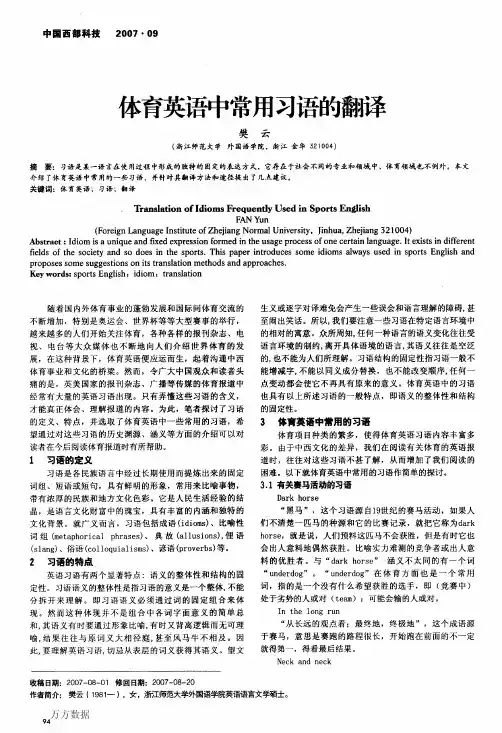
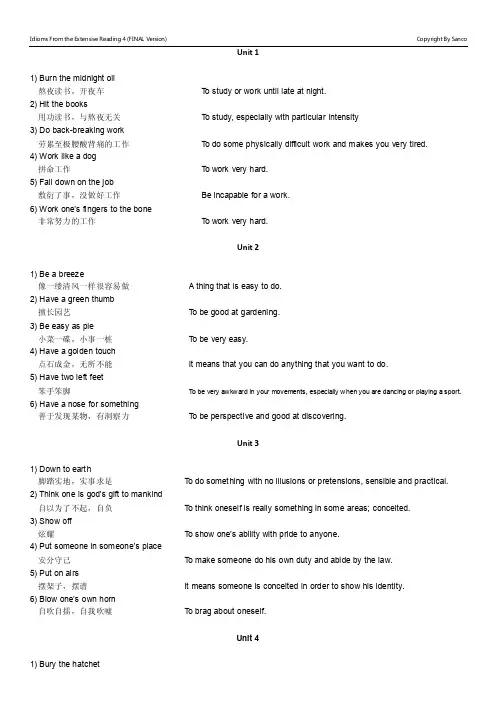
Unit 11) Burn the midnight oil熬夜读书,开夜车T o study or work until late at night.2) Hit the books用功读书,与熬夜无关T o study, especially with particular intensity3) Do back-breaking work劳累至极腰酸背痛的工作T o do some physically difficult work and makes you very tired.4) Work like a dog拼命工作T o work very hard.5) Fall down on the job敷衍了事,没做好工作Be incapable for a work.6) Work one’s fingers to the bone非常努力的工作T o work very hard.Unit 21) Be a breeze像一缕清风一样很容易做 A thing that is easy to do.2) Have a green thumb擅长园艺T o be good at gardening.3) Be easy as pie小菜一碟,小事一桩T o be very easy.4) Have a golden touch点石成金,无所不能It means that you can do anything that you want to do.5) Have two left feet笨手笨脚T o be very awk ward in your movements, especially when you are dancing or playing a sport.6) Have a nose for something善于发现某物,有洞察力T o be perspective and good at discovering.Unit 31) Down to earth脚踏实地,实事求是T o do something with no illusions or pretensions, sensible and practical. 2) Think one is god’s gift to mankind自以为了不起,自负T o think oneself is really something in some areas; conceited.3) Show off炫耀T o show one’s ability with pride to anyone.4) Put someone in someone’s place安分守己T o make someone do his own duty and abide by the law.5) Put on airs摆架子,摆谱It means someone is conceited in order to show his identity.6) Blow one’s own horn自吹自擂,自我吹嘘T o brag about oneself.Unit 4言归于好,和解,摒弃前嫌T o stop being unfriendly and become friends again.2) Button one’s lips一言不发,守口如瓶T o refuse to talk and be silenced.3) Flow with the tide跟风,紧随潮流T o keep following someone or the trend.4) Hold one’s tongue保持沉默,不开口T o say nothing about something and stay silent.5) Let sleeping dogs lie别无事生非,招惹麻烦To avoid mentioning a subject or something that happened in the past, in order to avoid any problems or arguments.6) Mind one’s own business少管闲事,管好自己To concern oneself only with what is of interest to oneself and not interfere in the affairs of others.7) Rock the boat捣乱T o do something that upsets a situation and causes problems.8) See eye to eye看法完全一致,完全同意T o share the same views as somebody about something.Unit 51) Face up to something勇敢的面对T o accept and deal with something that is difficult or unpleasant.2) Point one’s finger at someone指责某人T o accuse somebody .3) Leave someone high and dry使某人很无助To leave someone unsupported and unable to maneuver; to leave someone helpless.4) Shoulder the responsibility能够承担责任T o take responsibility.5) Pass the buck推卸责任T o shirk the responsibility.6) Worm out of something推卸摆脱某事T o get rid of somethingUnit 61) All or nothing孤注一掷的,没有商量余地 A situation which will end either in complete success or complete failureHaving no middle position or compromise available2) Meet someone halfway向某人妥协T o compromise to somebody3) Give-and-take妥协,互让,互相迁就T o have an exchange of views on some topic in order to make mutual concessions 4) Middle-of-the-road折中的办法,折中之计 A compromising solution that can be accepted by most people5) Stick to one’s guns固执己见T o maintain one’s position or viewpoint when faced with opposition6) Find middle ground寻求找到一个中间立场 A set of opinions and deci s ions that t w o or more groups w ho oppose each other can agree on1) Go through with经历困难而完成,把事情坚持到底To do something even though it may be very unpleasant or difficult for you2) Hang in there坚持,不气馁,不畏困难T o maintain a course of action despite negati v e outlook; to persist; to subsi s t while keeping high spirits 3) Give up放弃T o stop trying to do something4) Stick with坚持做某事T o continue or persist; to stick to5) Sweat out努力的忍耐以达到某个目的T o work very hard to achieve somethingUnit 81) Be a copycat模仿别人T o imitate or copy others2) Cut the apron strings摆脱依赖,独立生活T o be or become impossible to manage or to control3) Be a yes-man唯唯诺诺的人To be a person who always agrees with people in authority in order to gain their approval.4) Have a mind of one’s own自有主见,能够独立思考T o have one’s own idea and think independently5) Be on one’s own独立自主,不依靠他人T o be independent6) Lead someone by the nose牵着别人的鼻子走,完全控制别人To have a full control of somebody7) Stand on one’s own two feet独立自主,自力更生T o be independentUnit 91) Be as cool as a cucumber表示非常冷静,毫不紧张。
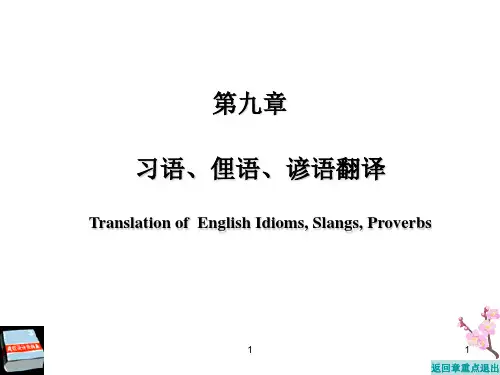
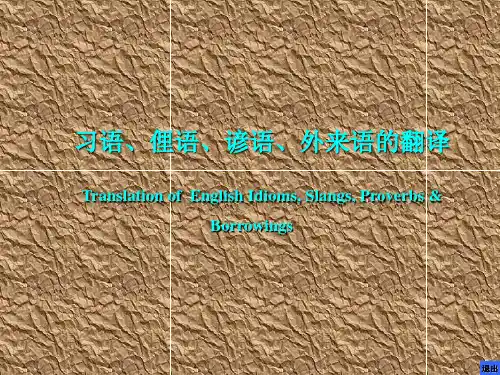
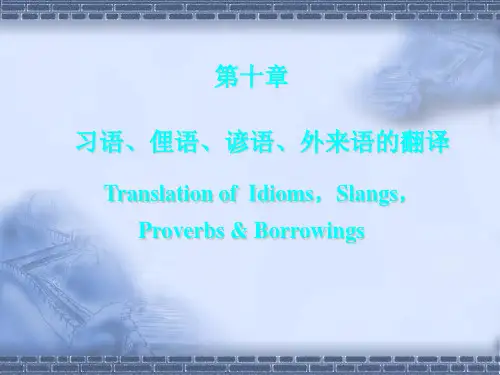
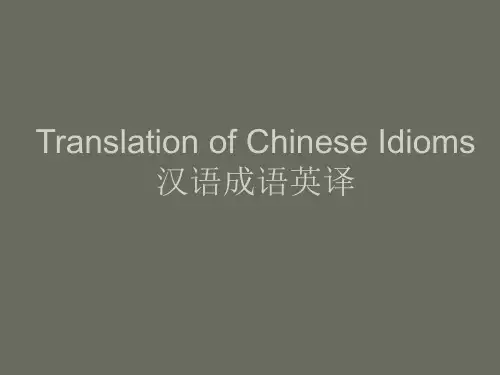
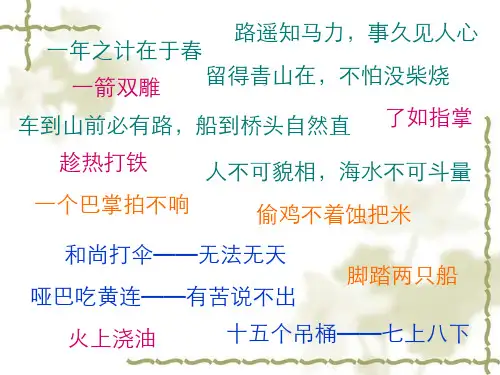
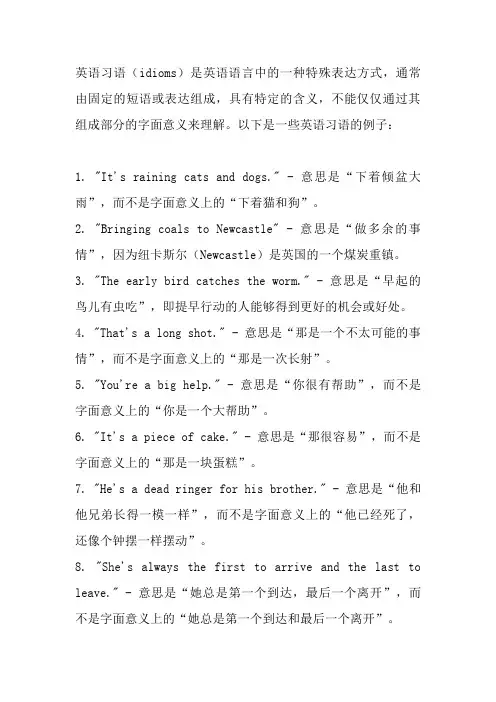
英语习语(idioms)是英语语言中的一种特殊表达方式,通常由固定的短语或表达组成,具有特定的含义,不能仅仅通过其组成部分的字面意义来理解。
以下是一些英语习语的例子:1. "It's raining cats and dogs." - 意思是“下着倾盆大雨”,而不是字面意义上的“下着猫和狗”。
2. "Bringing coals to Newcastle" - 意思是“做多余的事情”,因为纽卡斯尔(Newcastle)是英国的一个煤炭重镇。
3. "The early bird catches the worm." - 意思是“早起的鸟儿有虫吃”,即提早行动的人能够得到更好的机会或好处。
4. "That's a long shot." - 意思是“那是一个不太可能的事情”,而不是字面意义上的“那是一次长射”。
5. "You're a big help." - 意思是“你很有帮助”,而不是字面意义上的“你是一个大帮助”。
6. "It's a piece of cake." - 意思是“那很容易”,而不是字面意义上的“那是一块蛋糕”。
7. "He's a dead ringer for his brother." - 意思是“他和他兄弟长得一模一样”,而不是字面意义上的“他已经死了,还像个钟摆一样摆动”。
8. "She's always the first to arrive and the last to leave." - 意思是“她总是第一个到达,最后一个离开”,而不是字面意义上的“她总是第一个到达和最后一个离开”。
9. "He's a fast talker." - 意思是“他说话很快”,而不是字面意义上的“他说话很流利”。
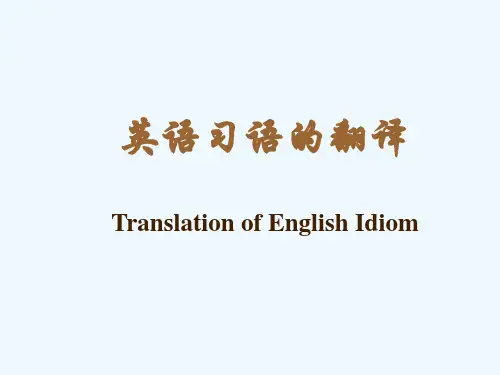
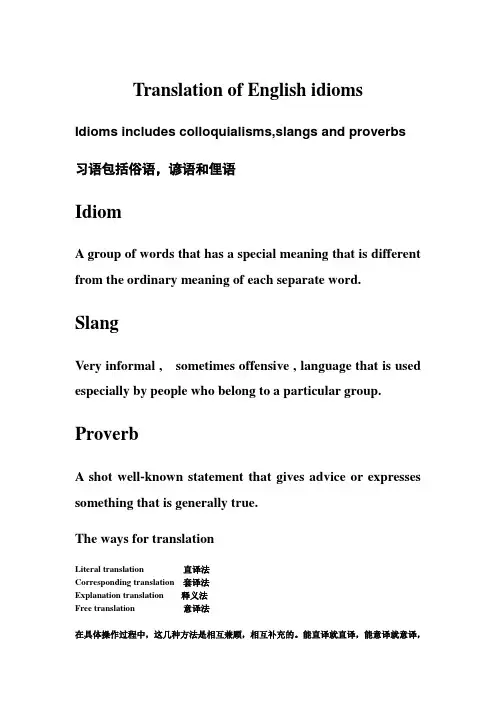
Translation of English idiomsIdioms includes colloquialisms,slangs and proverbs习语包括俗语,谚语和俚语IdiomA group of words that has a special meaning that is different from the ordinary meaning of each separate word.SlangVery informal , sometimes offensive , language that is used especially by people who belong to a particular group.ProverbA shot well-known statement that gives advice or expresses something that is generally true.The ways for translationLiteral translation 直译法Corresponding translation 套译法Explanation translation 释义法Free translation 意译法在具体操作过程中,这几种方法是相互兼顾,相互补充的。
能直译就直译,能意译就意译,能套译就套译。
以不损害原作的“异国情调”为前提,以保持“原汁原味”为特色,便是译者应遵循的翻译原则。
1. Translation of English Idioms习语的翻译1.1直译法不违背译文语言规范,不引起错误联想,能保持英语习语的比喻、形象、民族特色、地方习惯的译法。
a die-hard死硬派think tank思想库time frame时间框架the hot line热线paper tiger纸老虎armed to the teeth武装到牙齿comfort woman慰安妇to burn one’s boats破釜沉舟to fan the flame(s)煽风点火to turn a deaf ear to充耳不闻to have a well-oiled tongue油腔滑调a gentleman’s agreement君子协定an eye for an eye, a tooth for a tooth以眼还眼,以牙还牙Practice makes perfect.熟能生巧Long absent, soon forgotten. 久别情疏Add fuel to the fire. 火上加油Run with the tail between the legs.夹着尾巴逃跑walls have ears 隔墙有耳Under one’s nose 在某人鼻子底下Packed like sardines 挤得像沙丁鱼罐头Sour grapes 酸葡萄The Trojan horse 特洛伊木马The heel of Achilles 阿基里斯的脚跟The sword of Damocles 悬在达摩克利斯头顶上的剑The cold / hot war 冷战/ 热战An olive branch 橄榄树枝The open-door policy 门户开放政策The most-favored-nation policy 最惠国条款Shuttle diplomacy 穿梭外交A cat has nine lives 猫有九命Blood is thicker that water 血浓于水Barking dogs do not bite 吠狗不咬人A rolling stone gathers no moss 滚石不生苔1.2. Corresponding Translation 套译法用译文语言里的同义习语去套译原文中的习语的一种翻译方法套译法实际上也属于归化译法(domestication),但这种套译的机会不是很多。
广东外语外贸大学高等教育自学考试商务英语专业论文参考选题一、专业介绍本专业培养具有良好职业道德,掌握一定经贸理论知识、熟悉国际商务操作规程,具备扎实的国际经济和国际贸易理论基础,掌握国际经济与国际贸易的基本知识与基本技能,具有较扎实的英语听、说、读、写、译能力,较好的英语沟通能力的应用型英语人才。
毕业后能在外贸、文化教育、旅游(酒店)等行业从事翻译、外贸实务、教学和涉外文秘等工作。
主要课程:高级英语,综合英语,商务英语听说,商务英语翻译,国际贸易实务,外刊经贸知识选读。
二、选题要求1、论文选题必须是属于本专业方向范畴以内的,可参考本文所列的论文选题,但不仅限于本文所列的论文选题。
2、本文所列论文选题主要用于指引论文写作可选择的研究方向,不可照抄本文论文选题作为题目。
3、考生可选用本文论文选题中的关键词(红色字体),结合自己的写作思路或研究方向确定论文写作题目。
三、论文选题:Translation related topics:1.The Influence of Cultural Factors on Translation of idioms in Business English试论文化因素对经贸领域中习语翻译的影响2.Lexical Features of Business Contract English and Its Translation经贸合同英语的词法特征及其翻译3.The Characteristics of Foreign Trade English Translation经贸英语的翻译特点4.Influence of Contextual factors on Business English Translation经贸英语翻译中语境因素的作用5.On the Translation Criteria of Business English 试论经贸英语翻译的标准6.Understanding and Translation of the Divisional Phenomena in BusinessEnglish Contracts英语经贸契约分隔现象的理解与翻译7.On Abbreviations in Business English谈经贸英语中的缩略语现象8.On the Characteristics of Business English Vocabulary经贸英语的词汇特点9.Diction in Economy and Trade Translation经贸翻译的词义选择10.Multi-discipline motivations of the Business English Vocabulary论商务英语词汇的多学科性11.On the linguistic/ cultural Features of Business English E-mails浅谈商务英语电子邮件的写作特点12.Analysis of the Stylistic Features of the Contract English浅析合同英语的文体特点13.Translation of English Advertisement in Cross-cultural communication跨文化背景中的广告英语翻译14.Translation of Dates, Amount and Numbers in the Business English Contracts浅析商务合同中日期、金额和数字的翻译15.On Translating Strategies of Modern Business English现代商务英语的翻译策略16.On the Principle of Faithfulness in C-E Business Translation浅谈商务英语英汉翻译的"信"原则17.Methods and Principles of Trade Mark Translation商标翻译的方法及应遵循的基本原则18.The Linguistic Characteristics and Translation Strategies of EnglishAdvertisement广告英语的语言特点及翻译策略Linguistic aspects:19.A Study of the syntactic features in English Business Contracts 试谈英语经贸合同的句法特点20.On the Accuracy of Business English Translation浅析商务英语翻译的准确性21.On the Rhetorical Features and Translation strategies of Advertising English浅析广告英语的修辞特点及翻译方法22.Translation of Metaphor in Business English 浅谈商务英语中的隐喻翻译23.On "Faithfulness" and "Innovation" in Business English Translation外贸英语翻译的"忠实"与"变通"24.The Strategies of Domestication and Dissimulation on Advertising EnglishTranslation广告英语翻译的"归化"和""异化"策略25.Cross-cultural Factors i n Advertising English Translation广告英语翻译中的跨文化因素26.On the Rhetoric and Translation Approaches in Advertising English论广告英语的修辞艺术和翻译方法27.The Function of Fuzzy Language in Business English Writing论模糊语言在商务英语写作中的作用28.The Application of Polite Principles in Business English Writing 礼貌原则在商务英语写作中的应用29.On the Preciseness of Business English Contracts论商务英语合同语言的严谨性30.How to Achieve Consideration in Business E-mails如何实现商务电子邮件中的“consideration”31.An Analysis of the Rhetorical Devices in Advertising English广告英语的修辞方法探析32.On the Translation Principles of Trademarks in Business English浅析商务英语中的商标翻译33.On Functions of Business English Abbreviations 浅析商务英语中缩略语的功能34.Influence of Cultural differences on the Translation of Business English文化差异对商务英语翻译的影响35.On the Writing Features of Business English Letters 浅析商务英语信函的写作特点36.On Linguistic features of Business English Correspondence 商务英语信函的语言特征Culture related topics:37.The Influence of Cultural Elements on the Translation of idioms in BusinessEnglish 浅析文化因素对商务英语习语翻译的影响38.A Pragmatic Analysis of Long Sentences in Business English Contracts商务英语合同中的长句语用分析39.The Lexical Features of E-commerce English 电子商务英语的词汇特征分析40.A Study of the Cross-cultural Factors in Business Negotiation 商务谈判中的跨文化因素研究41.Functions of Non-verbal Communication in Business Negotiation 非语言交际在商务谈判中的功能研究42.A Study of Cultural Factors in Sino-American Business Negotiation中美商务谈判中的文化因素研究Business English teaching related topics:43.The Application of Case Study in Business English Teaching案例教学法在商务英语教学中的应用44.The Application of Situated Teaching Theory in Business English Teaching 情境教学理论在商务英语教学中的运用45.On Fostering Communicative Competence in Business English Teaching 试论商务英语教学中语言交际能力的培养46.The Application of Task-based Teaching in Business English Teaching 任务教学法在商务英语教学中的应用47.Cultivation of Cross-cultural Communication competence in BusinessEnglish Teaching 商务英语教学中跨文化交际能力的培养温馨提示:如《英语教育》专业本次以新专业《英语》申请学位,请参考旧专业《英语教育》论文选题。
Interpreting Idioms/ Two Parts Allegorical Saying 一言既出,驷马难追。
天下没有不散的宴席。
王小二过年,一年不如一年。
和尚打伞,无法(发)无天。
Methods of Interpreting Idioms●Idioms for idioms (以习语译习语)●Literal translation (直译法)●Literal translation plus paraphrasing (直译加意译)1. Idiom for idioms (以习语译习语)To fish in the air.缘木求鱼A fall into fit, a gain in your wit.吃一堑,长一智。
Look before you leap. / Think twice before you leap.三思而后行。
There is no smoke without fire.无风不起浪。
As you sow, so will you reap.种瓜得瓜,种豆得豆。
Better be the head of a dog than the tail of a lion.宁做鸡头,不做凤尾。
To kill the goose that lays golden eggs.杀鸡取卵。
Strike while the iron is hot.趁热打铁。
Don’t wash your dirty linen in publish.家丑不可外扬。
Hungry dogs will eat dirty puddings.饥不择食。
2. Literal translation (直译法)易如反掌鼠目寸光Short-sighted君子动口不动手留得青山在,不怕没柴烧。
海内存知己,天涯若比邻。
坦白从宽,抗拒从严。
Leniency confess, punishiment, resist 削足适履远水解不了近渴。
The Translation of Idioms--by Wu Xiaofei, Hu Ping, Fu Mei Thank you very much. Honorable Mr. Zhang, Ladies and gentleman, Good morning!I am very happy to have this chance to give my presentation.As you see, our theme is the translation of idioms.Firstly, I would like to talk about the definition of the terms I shall use in my presentation.DefinitionIdioms are words, phrases, or expressions that cannot be taken literally.In other words, when used in everyday language, they have a meaning other than the basic one you would find in the dictionary. Every language has its own idioms. Idioms are set phrases or short sentences that are unusual either grammatically or semantically for their meanings cannot be derived from the conjoined meaning of its elements, as in “It’s raining cats and dogs!”Background informationAs we all know, idioms can somehow reflect characteristics of culture. The Chinese and English idioms are actually the typical examples. I’d like to show the differences as follows.1.Differences of comparison (比喻)中国人常常用成语“雨后春笋”来形容一般事物的迅速发展和大量涌现。